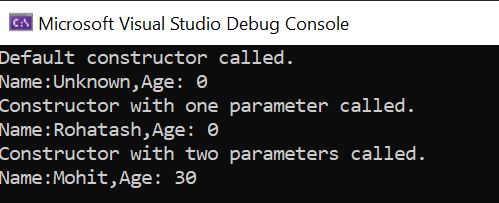Constructor Overloading
In this article we are going to discuss about constructor overloading with examples in C#.
Constructor Overloading
Constructor overloading in C# allows a class to have multiple constructors with different signatures. This enables the creation of objects in different ways, providing flexibility in object initialization. Each overloaded constructor can perform different initializations based on the provided arguments.
Syntax
Here’s the basic syntax for constructor overloading.
class MyClass
{
// Default constructor
public MyClass()
{
// Initialization code
}
// Overloaded constructor with one parameter
public MyClass(int param1)
{
// Initialization code using param1
}
// Overloaded constructor with two parameters
public MyClass(int param1, string param2)
{
//Initialization code using param1 and param2
}
}Example
Let's create an example class that demonstrates constructor overloading.
using System;
class Person
{
public string Name { get; set; }
public int Age { get; set; }
// Default constructor
public Person()
{
Name = "Unknown";
Age = 0;
Console.WriteLine("Default constructor called.");
}
// Constructor with one parameter
public Person(string name)
{
Name = name;
Age = 0;
Console.WriteLine("Constructor with one parameter called.");
}
// Constructor with two parameters
public Person(string name, int age)
{
Name = name;
Age = age;
Console.WriteLine("Constructor with two parameters called.");
}
public void DisplayInfo()
{
Console.WriteLine("Name:"+ Name +"," + "Age: "+ Age);
}
}
class Program
{
static void Main(string[] args)
{
// Using the default constructor
Person person1 = new Person();
person1.DisplayInfo();
// Using the constructor with one parameter
Person person2 = new Person("Rohatash");
person2.DisplayInfo();
// Using the constructor with two parameters
Person person3 = new Person("Mohit", 30);
person3.DisplayInfo();
}
}Output

When to Use Constructors Overloading
Constructor overloading is a powerful feature in C# that provides flexibility in object creation. Here are some scenarios where using constructor overloading is particularly beneficial.
1. Providing Multiple Initialization Options
When a class can be initialized in different ways, constructor overloading allows you to provide different constructors to accommodate various initialization scenarios.
Example
class Point
{
public int X { get; set; }
public int Y { get; set; }
// Default constructor
public Point()
{
X = 0;
Y = 0;
}
// Constructor with one parameter
public Point(int x)
{
X = x;
Y = 0;
}
// Constructor with two parameters
public Point(int x, int y)
{
X = x;
Y = y;
}
}2. Default Values and Optional Parameters
Constructor overloading can be used to set default values for parameters that are not always required.
Example
class Employee
{
public string Name { get; set; }
public int Age { get; set; }
// Default constructor
public Employee()
{
Name = "Unknown";
Age = 0;
}
// Constructor with one parameter
public Employee(string name)
{
Name = name;
Age = 0;
}
// Constructor with two parameters
public Employee(string name, int age)
{
Name = name;
Age = age;
}
}Prev Next
